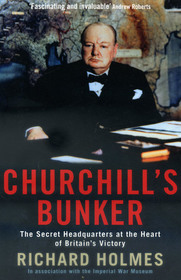An interesting narrative of the underground nerve center used during World War II by the British command. Turns out the principle actors didn't spend as much time down there as some movies would like you to believe. For example, Churchill hated being underground. So, since the main Post Office staff had completely moved out of town for the war, the big brass took over that building for many of its activities. For much of the war, the cabinet still met at No 10 Downing Street.
It was interesting to read about the power games the brass played to get control of rooms in the bunker, as well as in the post office. On the other hand, with London under daily bombing attacks and later at risk from the V-1 and V-2 rockets, it was commendable the powers-that-be, including the king and queen, remained in London despite some pressure to leave it.
One interesting aspect is the gains made by the 'girls.' In the beginning, male British 'principles' made it clear women would not be included in the power structure, or even as secretaries. This changed gradually, and then in a rush, as the male brass began to understand and appreciate the great competence and humanity the ladies brought with them. In the end, many powerful men openly admitted they couldn't have done it without the women.
It was interesting to read about the power games the brass played to get control of rooms in the bunker, as well as in the post office. On the other hand, with London under daily bombing attacks and later at risk from the V-1 and V-2 rockets, it was commendable the powers-that-be, including the king and queen, remained in London despite some pressure to leave it.
One interesting aspect is the gains made by the 'girls.' In the beginning, male British 'principles' made it clear women would not be included in the power structure, or even as secretaries. This changed gradually, and then in a rush, as the male brass began to understand and appreciate the great competence and humanity the ladies brought with them. In the end, many powerful men openly admitted they couldn't have done it without the women.




